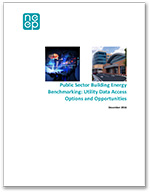 Across the United States, an increasing number of building operators are engaging in building energy benchmarking, the practice of tracking an existing building’s energy and water usage over time. These usage numbers are compared to previous measurements or modeled predictions for the building, or to the usage of other similar buildings. This process is a widely accepted first step toward reducing building energy usage, yet navigating a sea of bills and invoices spanning multiple utilities and fuel sources can be a time-consuming process not all building operators and facility managers are equipped to do.
Across the United States, an increasing number of building operators are engaging in building energy benchmarking, the practice of tracking an existing building’s energy and water usage over time. These usage numbers are compared to previous measurements or modeled predictions for the building, or to the usage of other similar buildings. This process is a widely accepted first step toward reducing building energy usage, yet navigating a sea of bills and invoices spanning multiple utilities and fuel sources can be a time-consuming process not all building operators and facility managers are equipped to do.
This report surveys the current landscape of public sector building energy benchmarking policies and programs in the Northeast and Mid-Atlantic region. It examines the tools used to access utility data and how municipalities across the region are using them to track usage as part of building energy benchmarking mandates. The report then highlights municipalities that serve as exemplars for accessing and using data to guide energy management decisions. Finally, the report offers a series of observed best practices to help steer public entities and municipalities onto a path towards effectively implementing building energy benchmarking initiatives.
